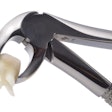There is nothing better than getting up each morning and knowing you’re going to work with outstanding people who do their jobs and help the practice flow smoothly and efficiently. It’s a great feeling that every dentist would like to have. Unfortunately, this not an everyday reality.
 Dr. Roger P. Levin.
Dr. Roger P. Levin.
While staff members are generally hard-working and dedicated people, they often create different challenges that must be addressed so they don’t create stress for the doctor. In addition, most dentists lose a tremendous amount of time during their careers due to inefficiency and handling tasks that should be handled by the team.
All of this contributes to stress, which can even lead to burnout. The question that every dentist should ask themselves is this: Is my staff reducing my stress?
The role of the staff
In the 1980s the word “staff” became “team.” Team became a nice way of talking about the staff and developing them into a group of people who would perform efficiently and effectively. The problem with a lot of the 1980s management education was that the team was supposed to suddenly and magically morph from whatever they were before into this new concept called a team and everyone would be happy.
In reality, things did get better. Dentists began to understand that they had a leadership role and began to make minor strides in that direction. However, staff members were also very different as employees in the 1980s and much of the 1990s.
It was not unusual for a team member to have an entire career in one office and show up for work almost every day demonstrating an excellent work ethic. Today, there seems to be a difference in attitude and work ethic.
Moreover, there is a willingness to change jobs or even industries on a regular basis. It is now more important than ever for practices to create a desirable work environment for staff members. This can be achieved better by galvanizing them into the practice culture, which is responsibility of the dentist and office manager; however, here is the reality:
Dentists are not trained as leaders. Leadership is one of the most difficult concepts to master, and it changes based on the circumstances. It is unlikely today that any office will have a team of people who are all totally in sync with similar goals, attitudes, and work ethics. It is up to the dentist as a leader to fill the right people in the right jobs to achieve the practice vision. Dentists who have no leadership or managerial background often struggle with the best ways to accomplish this. Unfortunately, we have found that one of the top strategies by dentists in dealing with team members who are not performing properly is to try to ignore the situation.
- Office managers are often staff members with management experience. Also in the 1980s, the concept of the dental office manager emerged. However, it is important to note that the title of office manager was something simply given to a long-term front-desk person. It was a nice way to give people a feeling of more importance by suddenly calling them an office manager. However, according to Levin Group data, approximately 95% of dental office managers have no management education, experience, or background. This means that while most dental office managers are performing the best they can, they are not necessarily taking on responsibility for all operational aspects of the practice.
Is your team reducing your stress?
The main point of this article is that your team should be reducing your stress every day. In fact, the goal is that the dentist would have no stress and be able to focus on clinical dentistry and patient relations only.
We refer to this dentist as a Level 4 leader, which is not easy to master or achieve. However, there is no chance of mastering it or achieving it if your team is not trained and skilled enough to handle all day-to-day operations and decisions.
A Level 4 leader has an office manager who makes almost all of the decisions every day. Furthermore, they have a team that knows exactly what their jobs are, how and when to complete tasks, and how to measure results. In this scenario, operating the practice is no longer the job of the doctor, and the doctor is rarely asked for administrative input or guidance. All practice operations are handled by a team who knows what to do and gets it done.
Having a team who knows what to do and gets it done reduces stress, because the dentist can then trust that the team will operate the practice properly, following excellent systems and protocols. As one front-desk staff member said to a Levin Group consultant, “I never asked the doctor anything. I know the values and mission of our practice and make decisions in alignment with those.” To me, this is a beautiful statement from a high-performing team member.
If you want to know if your team is reducing your stress, ask yourself the following questions:
- Am I, as a doctor, doing anything that anyone else could legally do?
- Have I delegated everything I possibly can to team members who carry out the task with excellence and positive results?
- How often am I disappointed or unhappy with the performance of a team member?
- Have team members made decisions that I believe are not in the best interest of our practice?
These four questions can change the trajectory of your career. As one dentist said to me a few years ago, “I am done. I can’t stand it anymore, and I simply refuse to do certain things. My team is going to have to step up.”
Once a decision like this is made, it is important to move logically and gradually. You can’t delegate everything tomorrow if you have hardly delegated at all, but you can easily delegate just about everything in around 12 months.
A year is an excellent time frame for team members to adapt and perform at a higher level. You can share with the team that you are going to begin delegating so that you can concentrate on excellence in dentistry and patient customer service. You can also explain to them why it is in the best interest of the practice for the dentist to concentrate on dentistry and the team to handle the day-to-day operations.
Keep in mind that there is one caveat. If you have team members who have a bad attitude or poor performance, this is the time to make a change. Don’t be afraid of taking time to find the right person or training someone who has potential. It is not that I am in favor of losing team members, but I am in favor of losing team members who increase stress.
Dentists who have teams that don’t reduce stress don’t realize that they are also losing production while they are unhappy. Teams that don’t perform at the highest level always cost practices “hidden“ production.
You may not see what you’ve lost, but you lose it, nonetheless. If you want to increase production, build a world-class team. This will automatically reduce your stress, because the team runs all day-to-day operations. They know their jobs and get their jobs done. They don’t rely on the dentist or office manager to guide them, and they perform at extremely high levels. Any practice that can transform into a low-stress practice will increase doctor time with patients and create a highly efficient and effective dental practice environment.
Dr. Roger P. Levin is CEO of Levin Group, a leading practice management and marketing consulting firm. To contact him or to join the 40,000 dental professionals who receive his Practice Production Tip of the Day, visit LevinGroup.com or email [email protected].
The comments and observations expressed herein do not necessarily reflect the opinions of DrBicuspid.com, nor should they be construed as an endorsement or admonishment of any particular idea, vendor, or organization.



















